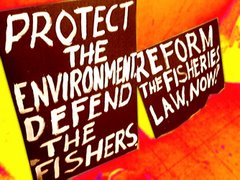SINULOG FOR CLIMATE CHANGE AND 350 UNLIGHTED CANDLES!
What is this about?
This is a creative action to inspire local and international community. We have representatives from Fardec, GLACC, Visayas Action Network, human rights organization, and fisherfolk groups to show we’ve joined 350.org. This means we representatives press for an International climate treaty that lowers atmospheric carbon dioxide to 350 parts per million. We also support local action that decreases Visayas’ fossil fuel dependency and vulnerability to climate change. The Visayas Climate Action Network is a Cebu-based network of various schools, universities, and other civil society organizations. It supports climate change re-skilling, environmental law enforcement, business partnerships, alternative policy development.
This is one of the many actions we take to tackle fossil-fueled commerce.
Why 350? This is the number that leading government-supported climatologists say is the safe upper limit for atmospheric carbon dioxide. As it stands our global atmosphere is concentrated with 390 parts per million.
Why do we hold posters saying Abandon Coal and offshore mining ? Because VCAN supports environmental law enforcement. And local coal and offshore mining do not comply with environmental laws. We do not reward large scale polluters. VCAN and its constituent orgs support suits against large scale polluters who endanger public health and again bring us farther from attain a safe upper limit of 350ppm. We honor data from real-world observation, climate models and international studies that conclude the more we burn COAL, OIL AND GAS the more damaging climate change will be. Visit 350.org or contact VCAN at visayas.can@gmail.com / 2561365 if you want to learn more about climate change.
Climate change will only compound the individual drivers of environmental disasters and injustice. If we don’t aim for 350ppm, you can expect more unexpected droughts, threatened access to water supply, declining crop yields, rising sea levels, severe storms, and the public’s permanent displacement.
Again, this is one of the many actions Visayas Climate Action Network supports. We invite you to research climate change for yourself. We invite the diversity of alternatives to tackle to climate crisis. We also invites all environmental groups, schools, labor groups, businesses and their form of climate change resistance. We’re interested in your food security strategies, policy alternatives, sustainable business practice, and environmental law enforcement. We invite you, your skills and knowledge to build communities resilient, not vulnerable, to climate change disasters.
Thank you.
JOIN US AND CONTACT US. Visayas.can@gmail.com 2561365 350.org/cebu
VISAYAS CLIMATE ACTION NETWORK – GLACC, FIDEC, FARDEC, SIBAT, CERNET, FPE, UC COLLEGE OF LAW, UP POLITICAL SCIENCE
Monday, October 26, 2009
Saturday, October 24, 2009
Thursday, October 22, 2009
Tañon unlike any worldwide

http://www.sunstar.com.ph/cebu/ta%C3%B1-unlike-any-worldwide
Tañon unlike any worldwide
By Liberty A. Pinili
THERE’s another reason to protect Tañon Strait.
American marine biologist Kent Carpenter said Tañon Strait, the narrow stretch of sea between the southern end of Cebu and Oriental Negros, may offer answers on why and how certain marine organisms are resilient to climate change.
Aside from this, Tañon Strait’s geology can be considered the “most unique in the world” as it was formed when two islands—Cebu and Negros—which used to be far from each other, moved closer.
Sun.Star accepts donations for victims of Typhoon Ondoy
“Over 55 million years ago, Cebu started to move from where Papua New Guinea is now while Negros came from the opposite direction. The strait must have accumulated an extremely unique group of marine organisms,” said Carpenter, who has studied the Philippines’ marine waters for about 30 years and has declared the seas around the Visayas to be the richest in biodiversity.
He said that during the Ice Age, the Tañon Strait was cut off from other seas so organisms in the area must have evolved differently.
Too special
“It’s too special a place to tamper with,” he said, reacting to plans to explore oil in the Tañon Strait. He added that the strait needs to be considered as a national heritage.
He said he plans to conduct a study on the species of marine organisms in the strait. He plans to start the study within a year or two.
Carpenter noted that while the Tañon Strait has been declared a national protected area, enforcement of protection laws has been wanting.
Still, he commends the Philippines for having the most number of marine protected areas in Asia. In Cebu, he cited the marine protected areas (MPAs) off Gilutongan Island in Cordova, Sam-boan, Sumilon (Oslob) and Moalboal.
“But only a small percentage of Philippines MPAs are well-managed. It’s not perfect but I’m hopeful that some environments will be preserved over a long period of time,” he said.
He stressed the importance of establishing a network of MPAs and strict enforcement of laws against destructive fishing practices.
Economic sense
He said communities and local governments tasked to manage MPAs should use the fees collected from divers to finance maintenance and protection measures.
He stressed that protecting the country’s marine environment also makes economic sense with long-term benefits.
Carpenter was in Cebu last week to talk to students in different universities about the importance of protecting the biological diversity of marine life in the Philippine seas.
His talks with Cebu students were part of the Coral Triangle Initiative, a joint project of six countries (Indonesia, Malaysia (Sabah), Papua New Guinea, Philippines, Solomon Islands and Timor-Leste), their neighbors (Australia, Fiji, New Caledonia and Vanuatu) and partners, including the United States, United Kingdom and the World Wildlife Fund.
The initiative aims to come up with national and regional (within the Coral Triangle) action plans to protect and manage the marine diversity in the Coral Triangle.
Scientists report that the Coral Triangle is home to more than 500 species of corals and 3,000 fish species. It holds 53 percent of the world coral reefs and has the greatest extent of mangrove forest than any region in the world.
Carpenter is one of the scientists assessing the threatened species list for the Coral Triangle area.
His visit to Cebu was part of the assistance pledged by the US to the Coral Triangle Initiative.
The United State’s Bureau of East Asian and Pacific Affairs and the US Agency for International Development have committed a total of $4.35 million to the initiative.
The initiative involves strategies to enhance the capabilities of seascapes; an ecosystem approach to fisheries management, where fisherfolk are given alternative livelihood; establishment and protection of marine protected areas; climate change adaptation; and threatened species assessment.
Tuesday, October 20, 2009
Groups eye Naga plants

Groups eye Naga plants
http://globalnation.inquirer.net/cebudailynews/news/view/20091020-231121/Groups-eye-Naga-plants
CEBU-based environmental groups recently joined an international campaign aimed at curtailing the effects of climate change by reducing greenhouse gas emissions.
Vince Cinches, Central Visayas Fisherfolk Development Center Inc. (Fidec) executive director, said their commitment to the group 350.org, consists of campaigning against coal-fired plants like those being set up in Naga City.
“An additional power plant would produce two parts per million (ppm) of carbon dioxide which is a type of greenhouse gas into the atmosphere,” Cinches said.
He said the country's carbon dioxide level now stands at 387 ppm.
Monday, October 19, 2009
Groups vow to push fight vs. power firms

http://www.sunstar.com.ph/cebu/groups-vow-push-fight-vs-power-firms
FOUR environmental groups said they will expand their opposition against the construction of two coal-fired power plants of the Korean Electric Company-SPC Power Corp. (Kepco-SPC) consortium.
The move showed the groups were unfazed by the rally in the City of Naga last week, where about 1,000 people expressed their support to the projects.
The Global Legal Action against Climate Change (GLACC), Fisherfolk Development Center (Fidec), Farmers Development Center (Fardec)) and the Naganhong Parokyano alang sa Kaluwasan sa Banay sa Naga (Nagpakabana Naga) said they will not only block the entry of Kepco-SPC but will also work on having the existing plants shut down.
Sun.Star accepts donations for victims of Typhoon Ondoy
The four groups will hold a press conference today to announce a series of mass protests and actions related to offshore mining, climate change and the Balili Beach Resort controversy.
The groups will hold the conference in celebration of the International Day of Climate Action.
Fidec executive director Vince Cinches said the Balili issue was accidentally discovered because they questioned why Cebu Gov. Gwendolyn Garcia entered into an agreement with Kepco for Capitol to dispose of the toxic waste of the Korean firm.
Paid
He said they received reports from their supporters in Naga that those who joined the rally were paid by somebody who is close to Kepco at P150 each.
“The Naga people who are pro-environment reported that to us. We are investigating it,” Cinches said.
But Naga Mayor Valdemar Chiong refused to comment on the matter. He said no amount of explanation can change the mind of Cinches and the others because they have another agenda.
Inoboran, Naga Barangay Captain Rodolfo Tomada Sr. said he and his constituents joined the rally in favor of Kepco because nobody has died of pollution-related diseases in Naga and Kepco will improve the town’s economy.
Lawyer Benjamin Cabrido of GLACC said they are now polishing their petition to the Supreme Court for the High Tribunal to stop the construction of coal-fired plants in Cebu.
Published in the Sun.Star Cebu newspaper on October 19, 2009.
Friday, October 2, 2009
Immediate Climate Action Needed to Prevent Future Destruction

Typhoon Ketsana Highlights Vulnerability of Developing Countries
Immediate Climate Action Needed to Prevent Future Destruction
Nature will not wait for Copenhagen.
This situation was made more clear as Typhoon Ketsana left widespread flooding in many countries, unleashed unprecedented rainfall in Metro Manila and caught a lot of people unprepared both in the Philippines and Vietnam.
In the face of increasing frequency and strength of these weather events, the lack of proper infrastructure and planning in cities and towns of developing countries puts their urban population at risk. Developing countries lack the capacity to adapt to climate change induced rains and flooding. Their food security is threatened as their crops are destroyed by typhoons and their lives and homes destroyed by landslides, flooding and strong winds.
Climate change already aggravates other environmental problems that communities have to face as a result of globalization's ever increasing destruction of our ecology. The poor communities that have long been struggling economically are unable to cope with this threat.
The foot-dragging of the UNFCC in the intercessional meeting currently being held in Bangkok must stop. It is no longer a question that human activity has produced dangerous climate interference. The member countries of the UN, especially those from the developing countries, should not let the US and the G8 sabotage the negotiations for their benefit. Our goal should be to avoid catastrophic effects that could affect more than half of the world's population that are most vulnerable to climate change.
Immediate climate action is needed now. We should insist that emitter nations, such as the US and other industrialized countries, indemnify communities and nations like ours so that we may be able to adapt to extreme weather events and other disasters that may come in the future.
We should strive for a post-Kyoto climate agreement that will truly contain scientific and real solutions away from market based mechanisms to address global warming and climate change related concerns of the people of the world.
We should strengthen our people's movements and mobilize our communities not only to adapt to the effects of climate change but to reject the current world system that brought us here in the first place.
International League of People’s Struggle (ILPS)* Ibon International*APWLD *350.org* ECOT* Kalikasan PNE* SDF* Peace for Life*AGHAM* Roots for Equity* AGHAM* PAN-AP* APRN* AIPP* Asian Peasant Women’s Network* CANGO* FIDEC* COP* EILER* KMP* NGO COD* SEA OilWatch* TCJWG
Pacc.secretariat@gmail.com /Tel. Nos. 0890683517
Labels:
bangkok,
climate change,
cop 15,
copenhagen,
fisherfolks,
kyoto protocol
Subscribe to:
Comments (Atom)











